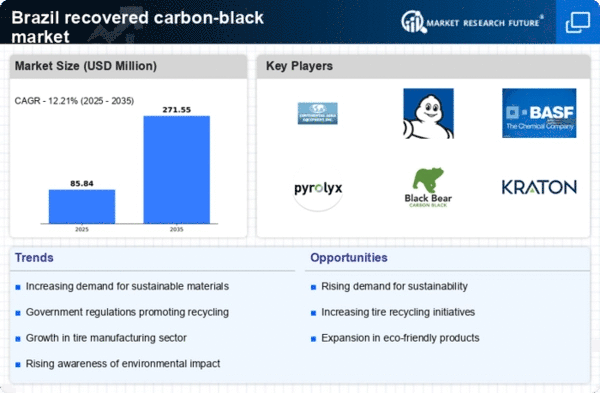The Brazil Recovered Carbon Black Market presents a dynamic landscape driven by the increasing demand for sustainable materials and the growing emphasis on circular economy practices. This segment of the market is characterized by a blend of established players and emerging companies that focus on the production and integration of recovered carbon black from various waste materials. The competitive environment is further influenced by regulatory frameworks promoting sustainability and innovation in recycling technologies.
Companies operating in this market are continually seeking to enhance their product offerings and operational efficiencies in order to gain market share and meet the evolving needs of their customers, resulting in a competitive race to adopt sustainable practices without compromising on quality. Daimler AG’s presence in the Brazil Recovered Carbon Black Market is marked by its commitment to sustainability and its strategic initiatives aimed at reducing the environmental impact of its operations. The company leverages advancements in technology to enhance the recovery processes and improve the quality of carbon black reclaimed from end-of-life materials.
With its robust R&D capabilities, Daimler AG focuses on integrating recovered carbon black into its automotive components, thereby promoting circular economy principles within the automotive sector. The strengths of Daimler AG lie in its extensive experience in manufacturing, a strong supply chain network in Brazil, and investments in innovation, allowing it to maintain a strong foothold in the market while adhering to environmentally friendly practices. SABIC's involvement in the Brazil Recovered Carbon Black Market signifies its dedication to sustainable development and the promotion of resource efficiency.
Known for producing high-quality polymers and chemicals, SABIC is increasingly focusing on the development of advanced materials that incorporate recovered carbon black, thereby providing environmentally friendly alternatives in various applications. The company's strengths in Brazil include its established market presence, strategic partnerships with local firms, and ongoing investment in research that aligns with sustainable development goals. SABIC's innovative portfolio includes more than just recovered carbon black; it encapsulates a broader range of products and services that meet industry demands while fostering a commitment to sustainability.
Through potential mergers and acquisitions, SABIC aims to bolster its capabilities and expand its market share, reinforcing its position as a leader in the sustainable materials sector within Brazil.


















Leave a Comment